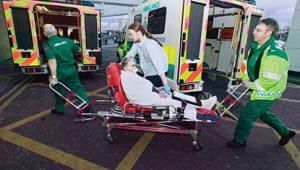By Nick Mann | 8 November 2011
Confusion over how ambulance services will be commissioned under the health service reforms could hamper efforts to improve patient care in rural areas, the NHS Confederation warned today.
In a report published by its Ambulance Service Network, the confederation says it will be ‘impossible’ to offer consistent standards of care without clarity over who will commission the various tasks ambulance services provide.
Currently, ambulance services are commissioned by primary care trusts but responsibility is being transferred to clinical commissioning groups involving GPs and nurses under the government’s NHS reforms.
In September, a Commons Public Accounts Committee report found a lack of clarity in how these groups and the new national NHS Commissioning Board would be involved in commissioning ambulance services.
These concerns were echoed today by the confederation, which called on the government to ‘urgently clarify’ the arrangements.
It explained that this was particularly important because of the various levels the ambulance service works at. It operates as a national service to respond to major emergencies, as a regional service for major traumas such as road traffic accidents and on a local level for services such as assisting old people when they fall.
The confederation called for commissioning of services such as responding to 999 calls to be made at regional or national level, but for decisions on local urgent care services to be made by clinical commissioning boards.
Jo Webber, director of the Ambulance Service Network, warned: ‘If these commissioning bodies are not aware of each other or how resources might need to be brought in from elsewhere to meet different priorities then it will be much harder to ensure that patients get access to the response they need.’
This confusion could reduce the positive impact of changes in the way ambulance services are measured from time-based targets to a wider range of factors.
Webber said: ‘Ambulance services are hopeful that the performance measures based on outcomes will help them by focusing effort on the care patients receive rather than solely on how quickly ambulances get to them.
‘But, to make this all work, we have to have clarity on how ambulance services are commissioned.’
She added: ‘As GP commissioners get up and running and the commissioning board starts its work, the government needs to provide the NHS with clarity on how this is all going to work.
‘Otherwise, patients risk getting lost in a more complex, fragmented and expensive system.’
Commenting on the report’s conclusions, a
spokeswoman for the Department of Health explained that clinical commissioning
groups would have the main responsibility for commissioning ambulance services.
‘The department expects clinical commissioning groups to commission urgent and
emergency care and ambulance services from providers who are best placed to
provide high-quality clinical services,’ she said.
‘We will set out clear expectations as to how commissioners should do this in
secondary regulations and this will be supported with detailed guidance from
the NHS Commissioning Board.’
The department has said that commissioning groups will be able to join forces to co-ordinate care over a
larger area under the NHS reforms, which are contained in the Health &
Social Care Bill now in the House of Lords.





















